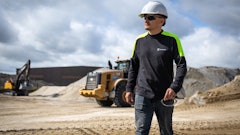
The climate crisis is growing increasingly dire, and some governments around the world are ramping up efforts to reduce greenhouse gas emissions in carbon-intensive industries. Thanks to its extensive size and reliance upon fossil fuels, the construction sector remains a prime area of opportunity. Construction is responsible for more than one-third of global carbon emissions—the industry must adopt a more sustainable business model.
To incentivize the built environment to curb their emissions, numerous major countries have introduced a wide range of sustainability-related policies, subsidies, and grants. While government regulations and increased public spending are crucial for combating climate change, reducing construction’s carbon footprint requires support from the private sector as well.
Despite increasing government support, the private industry needs to act quicker to deploy sustainable technologies on a mass scale. Government incentives and federal funding are not enough to facilitate this transition.
Action from the private sector is also required to meet ambitious sustainability goals through investing in cleantech startups and finding new ways to make better materials and structures. This includes funding research and development, scaling up the production of sustainable materials, and facilitating the adoption of carbon capture technologies, renewable energy production, and waste-to-energy systems. Through strategic partnerships and investments, the private sector can play a pivotal role in accelerating the transition to a more sustainable construction industry. Here’s how.
The Rise of 'Cleantech'
Fortunately, the past decade has seen significant advancements in methodologies for reducing carbon emissions, which have come to be called “cleantech.” And much of this cleantech applies directly to various stages of the construction process. One of these methodologies is called carbon capture, utilization, and storage (CCUS). CCUS represents a suite of technologies designed to contain the carbon dioxide produced during the manufacturing of many construction materials.
Many cleantech startups also specialize in turning construction waste into renewable energy sources or sustainable aggregates for the production of new concrete or cement. This involves innovative processes that transform leftover materials from construction sites into valuable resources, thereby reducing waste and promoting a circular economy. Meanwhile, in the solar energy sector, some startups are developing technologies capable of generating solar heat that’s powerful enough for industrial processes like cement manufacturing.
The point is that a fair amount of the technology needed to achieve net zero emissions in construction already exists, and governments are taking notice. To encourage the adoption of technologies like CCUS, the U.S. Inflation Reduction Act offers tax credits of up to $85 per metric ton of captured carbon emissions. In May of 2023, the Biden administration also announced an investment of more than $250 million to support 12 commercial CCUS projects.
In addition, world leaders have unveiled multiple long-term initiatives to reduce global dependence on fossil fuels. At the 2024 G7 Summit, participants committed to phasing out unabated coal power generation in energy systems and tripling the use of renewable energy globally within the next 10 years.
However, despite increasing government support, the private industry needs to act quicker to deploy sustainable technologies on a mass scale. Government incentives and federal funding are not enough to facilitate this transition.
 Gonzalo Galindo (left) with Phanos Hadjijyriakou (right), co-founder and CEO of 2050 Materials at Construction Startup Competition 2022. Construction Startup Competition is an annual global startup competition hosted by industry giants in the construction industry. Winners of the competition are invited to "Pitch Day", the competition's final milestone in Las Vegas, providing winners a chance to pitch their solutions to industry investors and potential partners and clients. "Pitch Day 2024" will take place at Trimble's Dimensions User Conference on November 11, 2024.CEMEX Ventures
Gonzalo Galindo (left) with Phanos Hadjijyriakou (right), co-founder and CEO of 2050 Materials at Construction Startup Competition 2022. Construction Startup Competition is an annual global startup competition hosted by industry giants in the construction industry. Winners of the competition are invited to "Pitch Day", the competition's final milestone in Las Vegas, providing winners a chance to pitch their solutions to industry investors and potential partners and clients. "Pitch Day 2024" will take place at Trimble's Dimensions User Conference on November 11, 2024.CEMEX Ventures
Private Funding
As in so many areas of technology, it’s very difficult for cleantech startups to garner and maintain momentum without consistent support from investors and venture capital firms. Groundbreaking advancements could be underfunded or underdeveloped, especially in such a rapidly evolving and increasingly competitive space.
Perfecting sustainability systems and technologies also involves extensive—and expensive—research and development, which can require more funding than any federal program can offer. The world’s existing startups would have struggled to put their ideas into action without the help of venture capital. But since governments are so committed to sustainability, there is a likelihood that investing in exceptional cleantech startups will be rewarded with additional government funding or financial incentives.
In the U.K. for instance, HiiROC is creating a proprietary process for low-cost, zero-emission hydrogen production. When used as an energy source, hydrogen can significantly reduce construction’s dependence on fossil fuels and reduce CO2 emissions. In 2022 and 2023, HiiROC received investment from Cemex Ventures, Cemex’s open innovation unit and Corporate Ventures Capital, to transition from fossil to alternative fuels and escalate the use of hydrogen in Cemex’s production processes. This is just one example of private funding fostering sustainable startup growth and innovation.
WtEnergy, another cleantech startup out of Spain, specializes in converting biomass and non-recyclable waste into clean energy for various industrial processes, such as the production of building materials. Backed by venture capital, WtEnergy has been awarded several multi-million dollar grants from the European Union for the implementation of its novel waste-to-fuel technology. Thanks to this combination of public and private funding, WtEnergy is finding opportunities in numerous countries and recently is helping establish Europe’s first large scale facility for the conversion of organic waste into hydrogen fuel.
Government assistance alone would probably not have been sufficient for these companies to combat construction’s emissions problem alone. The combination of public support and private funding has been crucial in allowing cleantech startups to innovate, scale, and implement their technologies on a global scale.
Participation
Lastly, construction’s transition to a more sustainable business model cannot take shape if the industry’s biggest players don’t participate. Fortunately, these technologies not only help reduce carbon emissions but also create long-term cost savings through increased efficiency and reduced energy consumption. Now, forward-thinking construction companies need to demonstrate the cost-cutting advantages of sustainability so the rest of their industry can take notice.
For major construction sector companies, current government incentives are encouraging widespread adoption. This is another example of how the private and public sectors can develop a more reciprocal relationship in making construction more sustainable. For major construction companies hesitant to take the first step, it's important to recognize that early adoption can result in a competitive advantage and drive further governmental support. As more construction companies demonstrate a genuine commitment to achieving net zero emissions, governments will be more inclined to introduce additional sustainability-related policies, regulations, and incentives, making the transition increasingly attractive for all industry players.
The technology to eliminate carbon emissions in construction to a significant extent has already arrived, but it needs the support of the private sector to become widely accessible. With more collaboration between the private and public sectors, cleantech startups can facilitate construction’s inevitable transition to a sustainable business model.



















